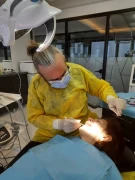
Choosing the Right Toothbrush
- Choosing the Right Toothbrush
- Bristle Hardness: Hard or Soft?
- Head Size and Shape
- Handle Design and Comfort
- Manual or Electric?
- Choosing with Gum Health in Mind
- How Often Should You Replace Your Toothbrush?
- Toothbrush Selection for Children
- Every Mouth is Unique
As a dentist, I answer dozens of questions about oral health every day. One of the most frequently asked and fundamental questions I encounter is: “Which toothbrush is the best?”
There’s no single correct answer to this question because the best toothbrush depends on the individual’s oral structure, gum health, manual dexterity, and personal habits. Still, it's possible to offer general guidance based on key criteria for choosing an ideal toothbrush.
Bristle Hardness: Hard or Soft?
The first factor to consider when choosing a toothbrush is the bristle hardness. Generally, toothbrushes come in three types: hard, medium, and soft.
I usually recommend soft or at most medium-bristled toothbrushes to my patients. Hard bristles can damage the enamel and cause gum recession, especially for individuals who brush aggressively. For people with sensitive gums, this can lead to more serious periodontal issues over time.
Head Size and Shape
The toothbrush head should be neither too large nor too small. Oversized heads can make it difficult to reach the back teeth. Small, rounded heads usually offer better maneuverability, allowing more effective cleaning of hard-to-reach areas like molars.
For children, specially designed toothbrushes with small heads and soft bristles should be used. It’s important to help them develop brushing habits under parental supervision.
Handle Design and Comfort
The handle should be ergonomic and easy to grip. Non-slip surfaces help keep fingers steady, enabling better control while brushing. This is especially important for elderly individuals with reduced hand mobility or those with orthopedic limitations—thicker and non-slip handles are more suitable in these cases.

Manual or Electric?
This is another very common question. Effective cleaning is possible with manual toothbrushes as long as the correct technique and sufficient duration are used. However, electric toothbrushes can be more advantageous in certain situations:
• For individuals with limited hand mobility
• For those undergoing orthodontic treatment (cleaning around brackets and wires is difficult)
• For children with low brushing motivation
• For individuals at risk of gum disease
Electric toothbrushes provide hundreds of vibrations per second, allowing more effective plaque removal. That said, it's still important to consider the bristle type, head shape, and proper usage duration.
Choosing with Gum Health in Mind
If you experience gum recession, bleeding, or sensitivity, be sure to use ultra-soft toothbrushes. Additionally, in such cases, interdental cleaning tools like dental floss and/or interdental brushes should be part of your oral hygiene routine.
How Often Should You Replace Your Toothbrush?
Even the best toothbrush doesn't last forever. Once the bristles start to deform, its cleaning power decreases. I generally recommend replacing your toothbrush every three months. In certain situations—such as after recovering from an infection—earlier replacement may be necessary.
Toothbrush Selection for Children
When choosing a toothbrush for a child, functionality should be considered along with appearance. Colorful designs and fun characters help capture a child’s attention, which is important for encouraging brushing habits. However, the toothbrush must still have soft bristles, a small head, and be age-appropriate. Children under the age of six should always brush with adult assistance.
Every Mouth is Unique
The most important point to remember is this: every individual’s oral structure and needs are different. Therefore, offering a “one-size-fits-all” toothbrush recommendation is not appropriate. The ideal toothbrush is the one that suits your oral health condition, habits, and manual skills.
I usually provide personalized recommendations to my own patients after an individual evaluation. If you are unsure about which toothbrush is right for you, consult a dentist to learn which option best suits your mouth.
Oral health is a part of overall health. Choosing the right toothbrush is one of the simplest yet most effective steps you can take on this journey.
Take good care of your teeth—they’re what give you your smile.

Dr. Mümtaz H. Uğur
Dentist




